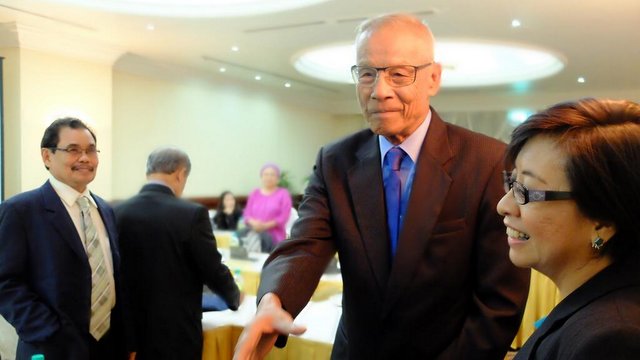
OBSERVER. Muntinlupa Rep Rodolfo Biazon attends the 41st round of peace talks between the government and the MILF. With him in the photo are MILF chief negotiator Mohagher Iqbal and government peace panel chair Miriam Coronel-Ferrer. Photo by OPAPP
Peace panels from the government and the Moro Islamic Liberation Front (MILF) extended their talks for another day as they inch closer towards agreeing on how power will be shared between the proposed Bangsamoro political entity and the national government.
"We just finished;
we'll continue tomorrow," government peace panel chair Miriam
Coronel-Ferrer said in a text message at 9 pm on Friday, October 11.
"We're still aiming to finish 1 annex so let's hope for the best."
Sources said
Presidential Adviser on the Peace Process, Secretary Teresita Deles, arrived in
Kuala Lumpur
The
last time Deles graced the talks was on July 13, when both sides signed the
annex
on wealth-sharing and revenue generation after a 12-hour
session.
Under the Framework
Agreement on the Bangsamoro (FAB) signed almost a year ago, the envisioned
political entity being discussed at the government-MILF peace table will take a
ministerial form of government.
The FAB has identified
most of the powers reserved for the central government, including defense,
foreign policy, global trade, monetary policy, citizenship and naturalization,
and postal service.
What is being negotiated
are the types of powers exclusive to the envisioned Bangsamoro government, and
concurrent or shared powers between the central government and the Bangsamoro.
Sources from both sides
earlier said the most contentious issue in the power-sharing annex is the item
on "territorial waters" around the proposed Bangsamoro area.
It is difficult because
it involves a plethora of factors on power, wealth-sharing, communication,
transportation, and security, MILF chief negotiator earlier Iqbal earlier said.
The talks are down to
the final aspects of the final peace pact.
Aside from the
power-sharing annex, both sides are also negotiating details on the most
sensitive issue of the talks: the process of normalization from conflict to
peace, which involves decommissioning of arms and disposition of armed forces.
Timeline
In his opening
speech, Iqbal asked both parties to resolve and finish the remaining
annexes at the soonest possible time.
He said the delay is
impeding the working timeline of the Bangsamoro Transition Commission, the body
tasked to draft the Basic Law. Iqbal also heads the commission.
Lawmakers said it would
be ideal for the Transition Commission to finish drafting the law by the first
quarter of 2014 to give Congress ample time to discuss and pass the measure.
Once the Basic Law is
passed by Congress and signed by the President, the Autonomous Region in Muslim
Mindanao will be deemed abolished. The MILF-led Bangsamoro Transition Authority
will take over until the election of Bangsamoro officials in 2016.
The current talks are
being held after the siege of Zamboanga by forces from a faction of the MILF's
rival group, the Moro National Liberation Front, which left at least 139 dead
and thousands displaced from their homes.
The MNLF under its
founding chairman Nur Misuari signed a peace deal with the government in 1996.
They staged the Zamboanga siege after feeling left out of the present peace
talks.
As both panels try to
hammer out an agreement in Kuala
Lumpur
Despite the setbacks,
both the government and the MILF hope the current peace talks will end the
40-year Muslim insurgency in Mindanao.
http://www.rappler.com/nation/special-coverage/peacetalks/41151-government-milf-extend-41st-round

No comments:
Post a Comment
Note: Only a member of this blog may post a comment.